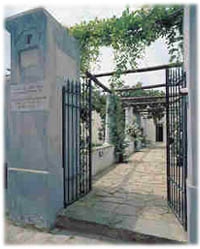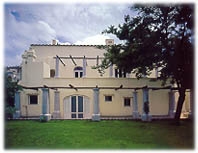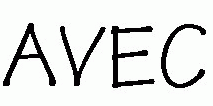Land abandonment and global change effects both represent expected changes to our environment in
the future. While global change includes temperature increase or precipitation change as physical
parameters, although partly anthropogenically-induced, land abandonment is a purely anthropogenic
influence on the landscape.
Global change effects will be noticeable in the future but land abandonment has already taken place.
In the last century, and especially over recent decades, agricultural landscapes have undergone huge
changes and two major, opposite trends have been recognised: intensification and abandonment. Here
we will focus on land abandonment and its effect on animal and plant communities. The progressive
abandonment of marginal and less productive areas has favoured the disappearance of traditional farm
landscape, replaced by shrubland and finally woodland. The consequences of this process are not well
known and this workshop should help to summarise the information and thus hopefully contribute to
maintaining biodiversity at a higher level.
Global change effects will affect the distribution, abundance and life
cycles of most species. The distribution will change with shifting vegetation
zones resulting from shifting climatic zones. Community structures and
compositions will change according to individual adaptation of species
of which some may not adapt at all. Vegetation shifts will determine consequent
shifts in animal distribution, resulting in changed patterns of predator-prey
interactions as well.
Effects of land abandonment and global change will be considered at the local to regional level with
results of dynamic global vegetation models as boundary conditions. Contrary to expectation, land
abandonment in the Mediterranean is not contributing to biodiversity but it helps invasion of northern
species while diminishing local species which had adapted over centuries to the mosaic landscape of
traditional farming practices there. The maintenance of these practices will be discussed.
The difficulties of the conflict between conservational aspects and other human interests, for example for the tourist
industry, can be dealt with as well. Another clash between interests is the invasion of wolves into
formerly wolf-free regions: would the inhabitants accept this on behalf of the higher interests of
biodiversity or would they hunt and kill them?
|
Please see here for the detailed
programme with pdf files of the presentations. And in case
you are curious about the place where the workshop took place go to the
photo gallery
to get an impression of the Villa Orlandi, Anacapri and
our field trip to the Monate Solaro. Here is the pdf list
of the participants and speakers with address details.
Workshop Conveners:
Wolfgang Cramer, Sandra Lavorel,
Stefano Mazzoleni, Volkmar Wolters
Sunday, 10 October 2004
Arrival and registration at Villa Orlandi
Monday, 11 October 2004
Global change and land abandonment: Past and present
Tuesday, 12 October 2004
Effects of land abandonment and global change
on biodiversity
Field trip with the funiculare to the Monte Solaro
Wednesday, 13 October 2004
Managing biodiversity under land abandonment and
climate change
and
Land abandonment under special risks: Fire and
mountain ecosystems
Thursday, 14 October 2004
Departure
|

The entrance to the Villa Orlandi
The workshop took place at the International Centre for
Scientific Culture of the University of Naples "Federico II":
Villa Orlandi
Anacapri, Capri, Italy
Tel.: +39 - 081 - 2537206
E-mail: vorlandi@unina.it
http://www.villaorlandi.unina.it/index_eng.html
The travel
directions (pdf: 100KB) from Naples to Anacapri and your hotel can
be downloaded as well as a map of the whole island of Capri.
A detailed map of Anacapri
is here.
Please have a look at the timetable
of ferries.

Villa Orlandi
(All fotos © by Villa Orlandi)
|

